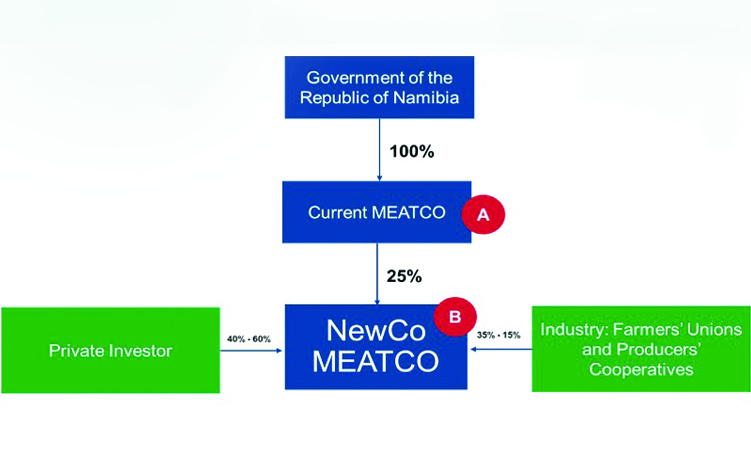The government has been advised to consider setting up a new company where private investors and farmers will have shareholding to avoid the collapse of the Meat Corporation of Namibia (Meatco).
This advice was given by Ombu Capital (Pty) Ltd, a consulting firm owned by former Standard Bank Namibia Holdings chief executive Vetumbuavi Mungunda.
Mungunda was also part of the high level panel on the Namibian economy, which had suggested that the state start privatising public enterprises that are in shambles.
The advice is part of Ombu Capital’s appointed duty, by the Development Bank of Namibia in consultation with the Ministry of Finance and Public Enterprises, to conduct an in-depth review of Meatco’s operations and recommend sustainable business model alternatives.
This feedback report seen by The Namibian was also reportedly tabled at Cabinet last week.
The rather damning six-month review of Meatco found that the state-owned entity was in an insolvent position, had recurring monthly gross losses, had lost the trust of producers and had a very unsustainable debt.
These were identified as the main problems facing the state-owned company.
The report comes to light shortly after the minister of finance and public enterprise, Iipumbu Shiimi, in a tweet dismissed rumours of the closure of Meatco.
“The story about Meatco being privatised/liquidated is fake. It is true that Meatco needs restructuring for it to become sustainable and we are working on a sustainable plan,” he said.
This year, Meatco received a N$66,7 million budget cut, and analysts have said it might not be able to stand up to expected competition from Savannah Beef Limited, which is yet to be operationalised.
WEIGHING OPTIONS
To address these issues, Ombu Capital proposed four strategic options for Meatco’s future: maintaining the status quo; cutting costs while maintaining operations; consolidating the industry and consolidating the industry with specialisation.
The first two options were deemed unviable, as they would lead to greater losses or unprofitable operations.
The last two options were seen as more promising, with the consultant recommending option three, which advocates industry consolidation, as the most feasible option to ensure Meatco’s future sustainability.
Under option three, Meatco would undergo a restructuring process that includes streamlining operations, retaining core assets, and amending the ownership and governance model to instil a producer “sense of belonging”.
This is the same way of doing business that has been adopted by Savannah Beef which had raised over N$140 million at the end of 2022.
Ombu Capital said using the same mode as that of Savannah Beef, “throughput is expected to peak at 66 000 head of cattle by year three, with N$218 million in net profit for Meatco. The estimated funding requirement is N$383 million (including working capital), to be funded with private equity,” reads the report.
The proposed structure under industry consolidation would involve two new legal operating entities, the Namibian Cattle Association (NCA) and the Smallholder Value Chain Fund (SVCF), with Meatco retaining a shareholding of 15% to 25%.
The remaining shareholding in the new operating entities would be vested in the private sector.
The proposed restructuring includes the creation of a new company (NewCo), which will be 75% owned by private investors and the industry, with Meatco holding the remaining 25% stake.
NewCo will be divided into four specialised subsidiaries or business units, each focused on a specific aspect of the meat processing value chain. These units according to the report will be responsible for NCA operations, feedlots and procurement, abattoirs and processing and marketing and trading.
To enable the proposed restructuring, the government would need to provide legal provisions under the Public Enterprises Governance Act of 2019.
This would allow Meatco to be identified for restructuring, and enable the creation of NewCo as a separate entity
One of the key aspects of the proposed restructuring is the ring-fencing of the four specialised business units.
By separating these units, according to the report, Meatco will be better equipped to measure performance and address the root causes of any problems facing the company.
“In the event where work is done to support the core mandate, but it is too costly (for example, transport and logistics), NewCo can choose to outsource what it is not good at and focus on executing its core mandate. NewCo will cater for all farmers regardless of their location in relation to the redline.
This will result in farmers equally benefiting from ownership in NewCo and will ensure that NewCo looks after the interests of all the Namibian industry participants,” reads the report.
According to the proposed restructuring, the government would also be a shareholder in the company, holding the 25% stake Meatco currently holds.
The minister of agriculture, water and land reform, Calle Schlettwein, confirmed receiving the report.
He said the report is going through a government consultation process.
During a staff meeting earlier this year, Schlettwein described Meatco as a limping institution that is in the intensive care unit.
In 2021, more than 200 meat producers threatened to leave Meatco and create their own beef selling consortium.
Meatco has assets worth N$1,1 billion, and its revenue for the 2021 financial year stood at N$873 million, with a cost of making that revenue at N$797 million, leaving a small gross profit of N$75,9 million.
Meatco made massive losses over the past four years – averaging N$68,2 million per year.
Meatco chief executive officer Mushokabanji Mwilima said the report was commissioned by the finance ministry.
“I advise that you engage them directly,” he said.
Text messages and calls to finance minister Iipumbu Shiimi went unanswered.
Email: bottomline@namibian.com.na
Stay informed with The Namibian – your source for credible journalism. Get in-depth reporting and opinions for
only N$85 a month. Invest in journalism, invest in democracy –
Subscribe Now!






